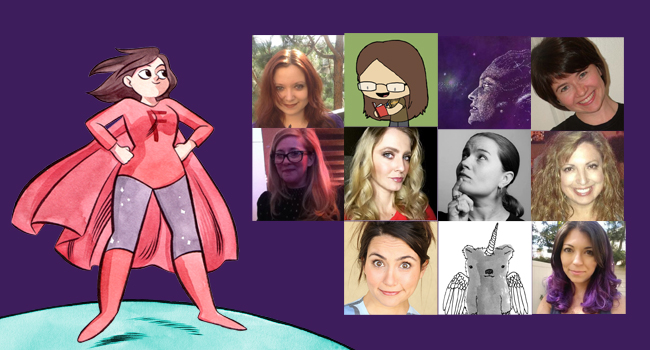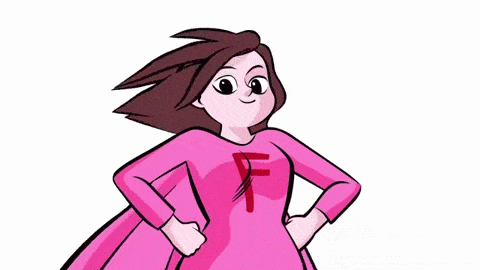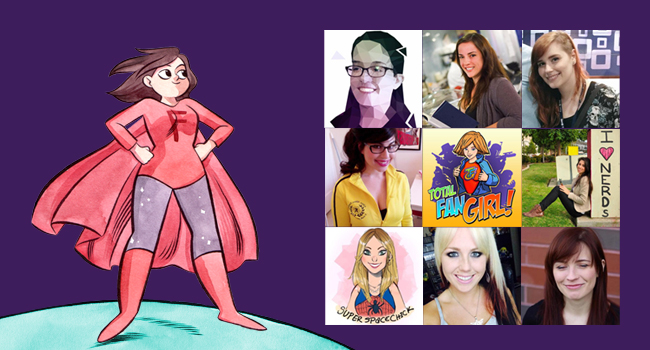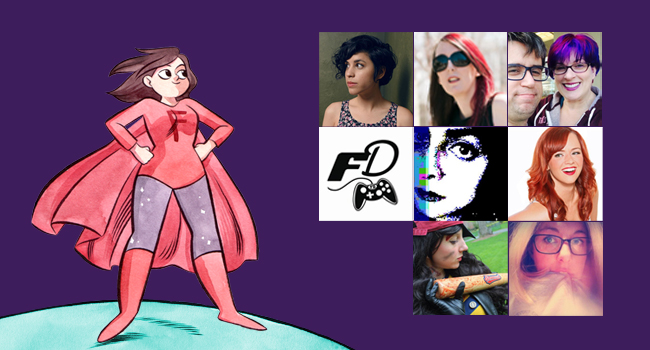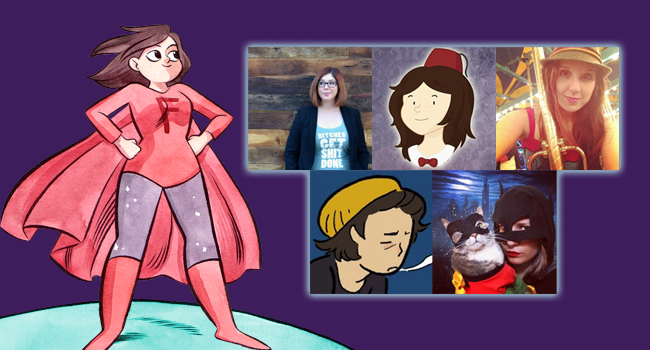The Fangirl’s Guide to Professional Fangirling: The Extended Edition
For The Fangirl’s Guide to the Galaxy, I wanted to speak the awesomest geeky gals in the biz, all about how their experience as a fan has influenced and shaped their lives. Unfortunately, due to a tight page count and a super-mean editor (just kidding, love you Blair! <3), we could only fit a few interviews into the final book. But there was so much goodness left over that I just had to share their geek girl wisdom with the world.
Today, I bring you some fangirl fabulousness from the women who have brought fangirling into their professions, including Daegan Fryklind, Shannon Morse, Sienna Morris, Tara Brannigan, Trin Garritano, Nikki Stafford, Dr. Janina Scarlet, Trisha Hershberger, Becky Chambers, Ashley Esqueda, and Dr. Rebecca Housel.
 Daegan Fryklind
Daegan Fryklind
Creator and executive producer for Space and Syfy’s Bitten, and co-executive producer and writer for CTV and ABC’s Motive. Followe her at @daeganf.
“You are who you are. Own it. I love writing and hate wearing nylons, so I turfed a career path that was taking me into advertising and swung hard for the fences. I think that's a sports reference. I also did say someone would ‘defend us to the high heels’ this week, so I wouldn't trust me with adages lately. Do what gives you the feels, and when you feel that thing inside that you can't quite put your finger on but it's sort of great and confusing at the same time… that's you being proud of what you're accomplishing, and you're on the right path.”
 Shannon Morse
Shannon Morse
Podcaster, producer, tech enthusiast, and host for Hak5, Revision3, and TWiT.tv. Follow her at @Snubs.
“To me, the word ‘fangirl’ encompasses many things. A fangirl is someone who is incredibly passionate about a topic, be that a comic book, anime, video game, or something from nerd culture. They aren't afraid to go to an anime convention dressed as their favorite Sailor Moon character, or walk out of a book store with the first edition of the newest sci-fi book from their favorite author. They stand in line at Hall H during San Diego Comic-Con just to see their favorite stars, and they make friends with other fans in line. A fangirl may have been made fun of when they were growing up, but the family and friends that they have understand their passions and don't judge them based on their book cover. Fangirls are loving, caring, passionate women.”
 Sienna Morris
Sienna Morris
Artist and creator of the drawing technique “Numberism,” which combines science and math with art. Follow her at @MrsSiennaMorris.
“You’re not alone. You're weird, but so are we. I don't mean just the girls here in the big world of geekdom; I mean the guys too. There have always been jerks in any culture, and there have certainly been guys who push ladies out of the game, but there are others too. There are men and women alike in this geeky world that you'll find are your comrades. People who have been here for a while and who will welcome you in, help you out and teach you a thing or two if you ask and listen. Seek those people out, and cut out those who try to restrain you. Find people who push you, who challenge you, teach you and love you for your geekiness, for your passion, for your art and for your brain (be they girls or boys). You'll find they are just as eager to show you everything they know as you are to learn and experience it.
We have struggled to get here. Women before you have fought through boundaries to make a place for themselves in the professional world of geekdom and it has not often been easy. It took thousands of us to push forward and refuse to leave. Celebrate in this success and pay it forward. The worst thing about being a geek girl for us over the years was being ridiculed, tested and excluded. This isn't just about girls and guys; it's about offering a welcoming environment to everyone to participate in this world. Basically; don't be a bully, don't exclude others and don't assume that someone who is new to your world doesn't belong there. That's the only way to keep this going.”
 Tara Brannigan
Tara Brannigan
Customer Relationship Manager at PikPok Games and nerdy jeweler. Follow her at @kindofstrange.
“My entire professional career has really been a result of being a geek!! I’ve managed to make a living working in the video game industry, spending too much time on social media, and generally doing the things I love. If I wasn’t geeky about video games, I doubt I would have ever ended up where I am today. Thankfully, my mother has always been a really positive force in my life, and has always encouraged me to follow my passions, regardless of how geeky they might have been. She’s a CATIA engineer (high-end 3D modeling) for the aeronautics and automotive industries, so she’s always been a great role model for women excelling in heavily male-dominated, geeky fields. She never discouraged my interest in video games, even though they’re not really her thing, and has always encouraged me to pursue what I enjoy. Without her support, I’m not sure that I would have had the courage to keep at it at times. I owe her a great deal of credit for who I am today.
Outside of my career, being a geek has helped me find many of my online and real world friends. If it wasn’t for geeking out on forums well over a decade ago, I wouldn’t have met many of those I consider my very best friends. From gamers, to metalsmiths, to other nature nerds, my desire to geek out and find others that share the same passions has led to some incredible friendships and experiences throughout the years, for which I am eternally grateful.”
 Trin Garritano
Trin Garritano
Events manager at Cards Against Humanity, and producer of season 2 of Tabletop Deathmatch. Follow her at @TrinAndTonic
“Take up as much space as you want and be as loud as you wish. Put that weird thing in your head out there. Talk about it. Get your friends’ opinions and then ignore as many as you want to. Above all, support other women. Tell the women you admire why you admire them. Be loud about your support of other women. It's incredibly cheesy, but joy will attract joy.”
 Nikki Stafford
Nikki Stafford
Writer, TV addict, and author of companion guides (like Finding Lost) for shows including Xena, Buffy, Angel, Alias, and Lost. Follow her at @nikki_stafford.
“To me, a fangirl is any woman who loves popular culture enthusiastically and unabashedly, and isn’t afraid to show it. Women used to be on the sidelines of fandom, and even into the ’80s, ’90s, and early ’00s fangirls were seen as people on the periphery, regardless of our involvement at conventions and gatherings, on message boards and in chatrooms. But the fangirl’s emergence from the shadows of fandom perhaps has something to do with the change in the characters and franchises we love. We’ve gone from Uhura and Princess Leia – strong women, yes, but women who are often secondary to the men – to female leaders like Buffy, Xena, Sydney Bristow, Captain Janeway, Scully, and Nikita coming to the fore in the late ’90s. Girls who grew up on those shows have become women who view our role within fandom as equal to that of the guys. With female-centric conventions like GeekGirlCon thriving on the west coast, and websites popping up celebrating the geek girls, I’m hoping that by the time my daughter is in her twenties, we won’t have to keep talking about why fangirls are as important as fanboys; it’ll just be accepted that we are.”
 Dr. Janina Scarlet
Dr. Janina Scarlet
A Licensed Clinical Psychologist who incorporates, fantasy, TV, sci-fi, and comics into her therapy sessions to help clients with anxiety and depression. Follow her at @ShadowQuill.
“My family and I moved to the US when I was twelve. Being from another culture, it was hard for me to relate to my classmates, but I was able to relate to different characters from TV shows and fantasy books. In the long term, these experiences not only helped me feel more understood, but they also helped me to better understand others, serving as great role models for love, compassion, and friendship.
Now that I am seeing patients with trauma, depression, and anxiety, I incorporate my patients' favorite characters from comics, TV shows, and movies into treatment. I believe that it is often easier for us to understand and process the painful emotional experiences that our favorite characters go through than our own, and that by identifying with our favorite characters, we might also be better able to understand ourselves. This understanding can often serve as the very thing we need in order to accept ourselves and begin our process of our own recovery. As Albus Dumbledore said, ‘Understanding is the first step to acceptance, and only with acceptance can there be recovery.’”
 Trisha Hershberger
Trisha Hershberger
YouTuber (“The Naked Truth,”) actress, and host Sourcefed and SourcefedNERD. Follow her at @thatgrltrish.
“Trust that there are others like you. The internet makes it easier than ever to find community. Don't allow fear of the judgment of the few hundred people at your school to stop you from finding the thousands or millions even online who love the same things you do! Be yourself – that's where you will find happiness – and once you've found that, the world is yours!”
 Becky Chambers
Becky Chambers
Author of The Long Way to a Small, Angry Planet, former Weekend Editor and games writer at The Mary Sue, creator of Mathom House. Follow her at @beckysaysrawr.
“To me, being a geek is all about joy. It's this sort of raw, hyper-focused enthusiasm. Being a geek means interacting with the things I love unabashedly and unashamedly. Ever since I was little, I've loved getting lost in ideas, be they stories or science. I love to learn, I love to think, and I love to understand things on a microscopic scale. It wasn't until high school that I realized that there was a word for people like that, and a culture that existed around it. So, knowing that there is a general category of humanity that I fit into, in which there are other people who approach their interests with the same sort of gusto that I do… that's the most wonderful thing there is. That's community. That's belonging. There's nothing in the world more positive than that feeling. I wouldn't have the friends that I have (or my partner, for that matter) without engaging in geeky circles. Plus, everything is fun when you're a geek! I think we're some of the most rampantly gleeful people on the planet, and I can't think of a better way to go through life.”
 Ashley Esqueda
Ashley Esqueda
Senior Editor at CNET and host of their tech talk show Tomorrow Daily. Follow her at @AshleyEsqueda
“By being a geek, I’ve made great friends, been hired for great jobs, and made some awesome connections across industries, just because I love video games, science, tech, and all the other good stuff people consider ‘geeky.’ I don’t think there’s a single part of my life that hasn’t been influenced by my being a geek. It just permeates everything I do, and awesome things happen. Also, it’s kind of amazing I met my husband through video games (we met on the Star Wars Galaxies forums for Smugglers). If I wasn’t such a total geek who lives on the internet all the time, and if that technology hadn't existed in 2004, we would have never met. He’s by far the greatest thing to ever happen to me. I guess being a geek really gave me my entire adult life, through ways I never thought possible.”
 Dr. Rebecca Housel
Dr. Rebecca Housel
Pop culture professor, comedian, author, editorial advisor for the Journal of Popular Culture. Follow her at @DocHousel
“Be confident. Don't let ‘the man’ intimidate you or make you feel less than; that you somehow don't belong unless you're wearing a skin-tight costume accentuating your tits and ass for the sole benefit of the men around you. You belong. But you have to believe it. And second, laugh at the haters. The people who say you won't make it in comics, graphic novels, movies, television… they're wrong. And if you stay the course, you'll be laughing all the way to the bank. After all, living well is the best revenge.”

Sam Maggs
SAM MAGGS is an Assistant Writer at BioWare and the bestselling author of WONDER WOMEN and THE FANGIRL’S GUIDE TO THE GALAXY, both from Quirk Books. An authority on women in pop culture, Sam was named “Awesome Geek Feminist of the Year” by Women Write About Comics and has spoken on the topic for The New York Times, Vulture, NPR, the CBC, Space Channel, and more. Her first comic is forthcoming from IDW. Among others, Sam has also been published by Marie Claire, PC Gamer, The Guardian, and the National Post. Sometimes you might see her on TV and movie screens. She loves YA lit, Pacific Rim, Mass Effect, Carol Danvers, and Jeff Goldblum.
